University International Trade Law: C.I.F. Contracts Analysis
VerifiedAdded on 2021/04/21
|7
|1563
|140
Homework Assignment
AI Summary
This assignment delves into the intricacies of international trade law, specifically focusing on Cost, Insurance, and Freight (CIF) contracts. It examines the Carriage of Goods by Sea Act 1992 and the role of the bill of lading as evidence in sales agreements. The analysis includes case studies such as Barclays Bank Ltd v Commissioner of Custom & Excise, Sanders Brothers v Maclean & Co, and Lickbarrow v Mason to illustrate key legal principles. The assignment further explores the rights of buyers, including the right to reject goods and documents, referencing the Sale of Goods Act 1979. It also addresses scenarios where documents can be rejected and the consequences of accepting documents, as highlighted in Federal Commerce & Navigation v Molena Alpha. The assignment concludes by summarizing the rights and obligations of parties involved in international trade transactions, particularly under CIF contracts.
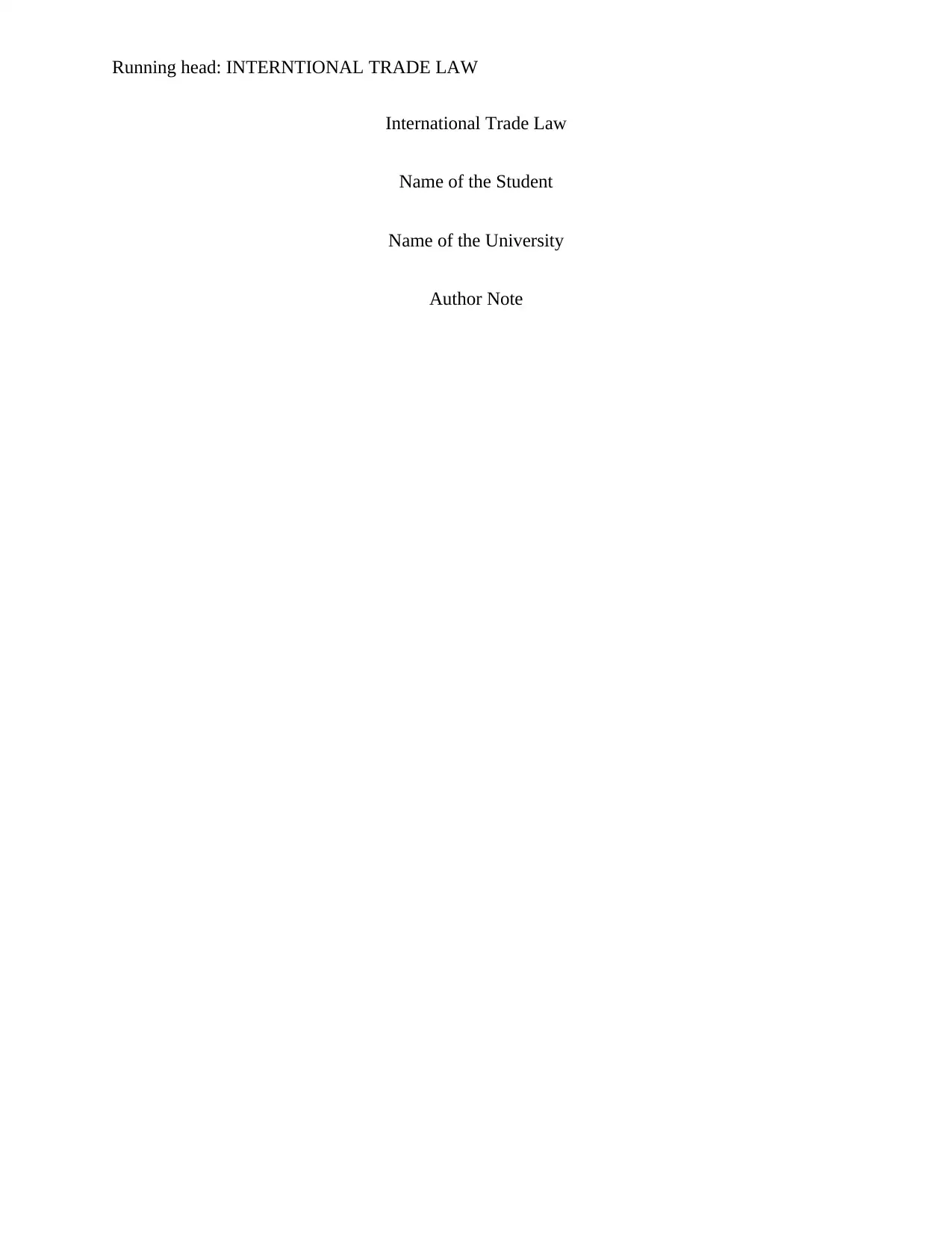
Running head: INTERNTIONAL TRADE LAW
International Trade Law
Name of the Student
Name of the University
Author Note
International Trade Law
Name of the Student
Name of the University
Author Note
Paraphrase This Document
Need a fresh take? Get an instant paraphrase of this document with our AI Paraphraser
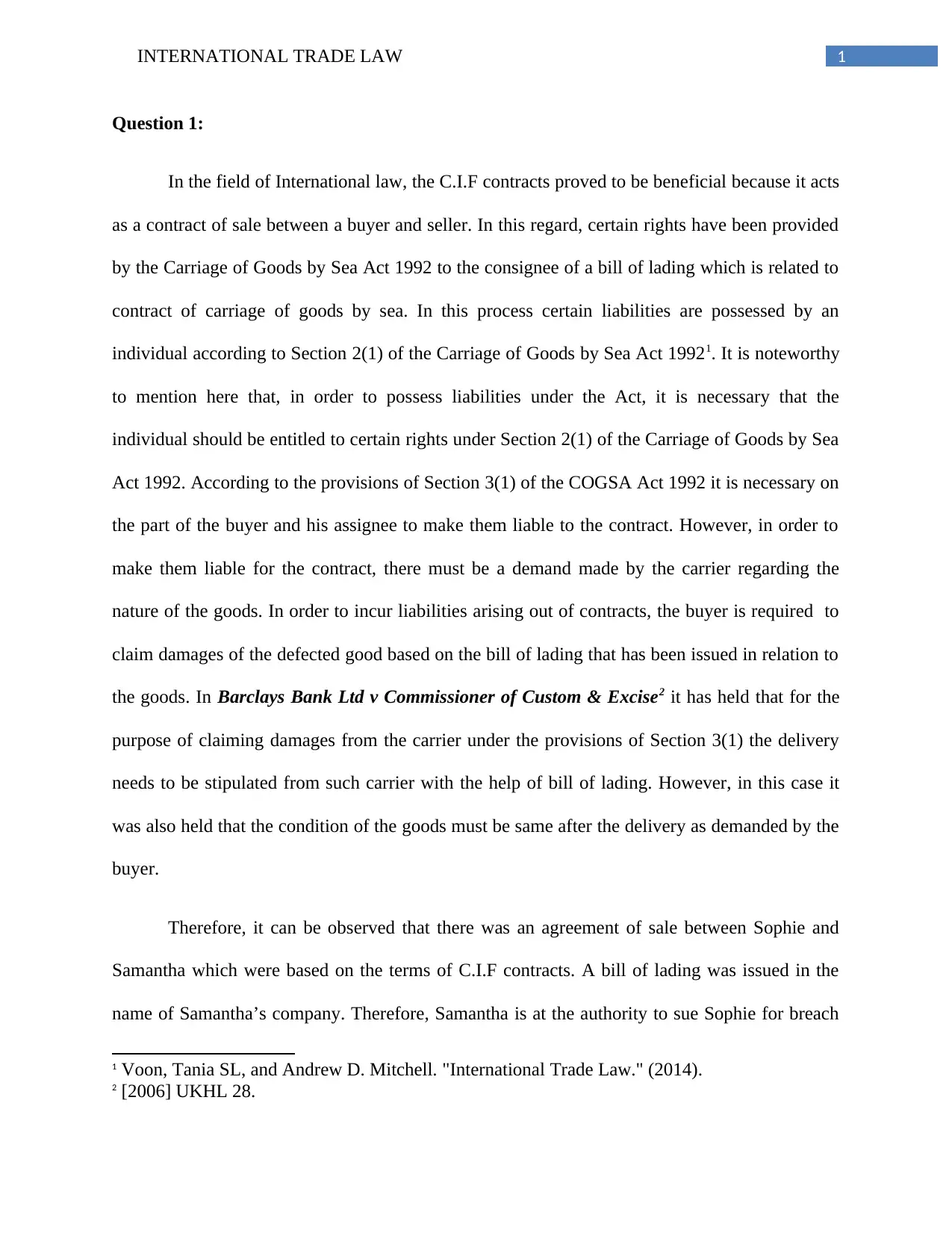
1INTERNATIONAL TRADE LAW
Question 1:
In the field of International law, the C.I.F contracts proved to be beneficial because it acts
as a contract of sale between a buyer and seller. In this regard, certain rights have been provided
by the Carriage of Goods by Sea Act 1992 to the consignee of a bill of lading which is related to
contract of carriage of goods by sea. In this process certain liabilities are possessed by an
individual according to Section 2(1) of the Carriage of Goods by Sea Act 19921. It is noteworthy
to mention here that, in order to possess liabilities under the Act, it is necessary that the
individual should be entitled to certain rights under Section 2(1) of the Carriage of Goods by Sea
Act 1992. According to the provisions of Section 3(1) of the COGSA Act 1992 it is necessary on
the part of the buyer and his assignee to make them liable to the contract. However, in order to
make them liable for the contract, there must be a demand made by the carrier regarding the
nature of the goods. In order to incur liabilities arising out of contracts, the buyer is required to
claim damages of the defected good based on the bill of lading that has been issued in relation to
the goods. In Barclays Bank Ltd v Commissioner of Custom & Excise2 it has held that for the
purpose of claiming damages from the carrier under the provisions of Section 3(1) the delivery
needs to be stipulated from such carrier with the help of bill of lading. However, in this case it
was also held that the condition of the goods must be same after the delivery as demanded by the
buyer.
Therefore, it can be observed that there was an agreement of sale between Sophie and
Samantha which were based on the terms of C.I.F contracts. A bill of lading was issued in the
name of Samantha’s company. Therefore, Samantha is at the authority to sue Sophie for breach
1 Voon, Tania SL, and Andrew D. Mitchell. "International Trade Law." (2014).
2 [2006] UKHL 28.
Question 1:
In the field of International law, the C.I.F contracts proved to be beneficial because it acts
as a contract of sale between a buyer and seller. In this regard, certain rights have been provided
by the Carriage of Goods by Sea Act 1992 to the consignee of a bill of lading which is related to
contract of carriage of goods by sea. In this process certain liabilities are possessed by an
individual according to Section 2(1) of the Carriage of Goods by Sea Act 19921. It is noteworthy
to mention here that, in order to possess liabilities under the Act, it is necessary that the
individual should be entitled to certain rights under Section 2(1) of the Carriage of Goods by Sea
Act 1992. According to the provisions of Section 3(1) of the COGSA Act 1992 it is necessary on
the part of the buyer and his assignee to make them liable to the contract. However, in order to
make them liable for the contract, there must be a demand made by the carrier regarding the
nature of the goods. In order to incur liabilities arising out of contracts, the buyer is required to
claim damages of the defected good based on the bill of lading that has been issued in relation to
the goods. In Barclays Bank Ltd v Commissioner of Custom & Excise2 it has held that for the
purpose of claiming damages from the carrier under the provisions of Section 3(1) the delivery
needs to be stipulated from such carrier with the help of bill of lading. However, in this case it
was also held that the condition of the goods must be same after the delivery as demanded by the
buyer.
Therefore, it can be observed that there was an agreement of sale between Sophie and
Samantha which were based on the terms of C.I.F contracts. A bill of lading was issued in the
name of Samantha’s company. Therefore, Samantha is at the authority to sue Sophie for breach
1 Voon, Tania SL, and Andrew D. Mitchell. "International Trade Law." (2014).
2 [2006] UKHL 28.
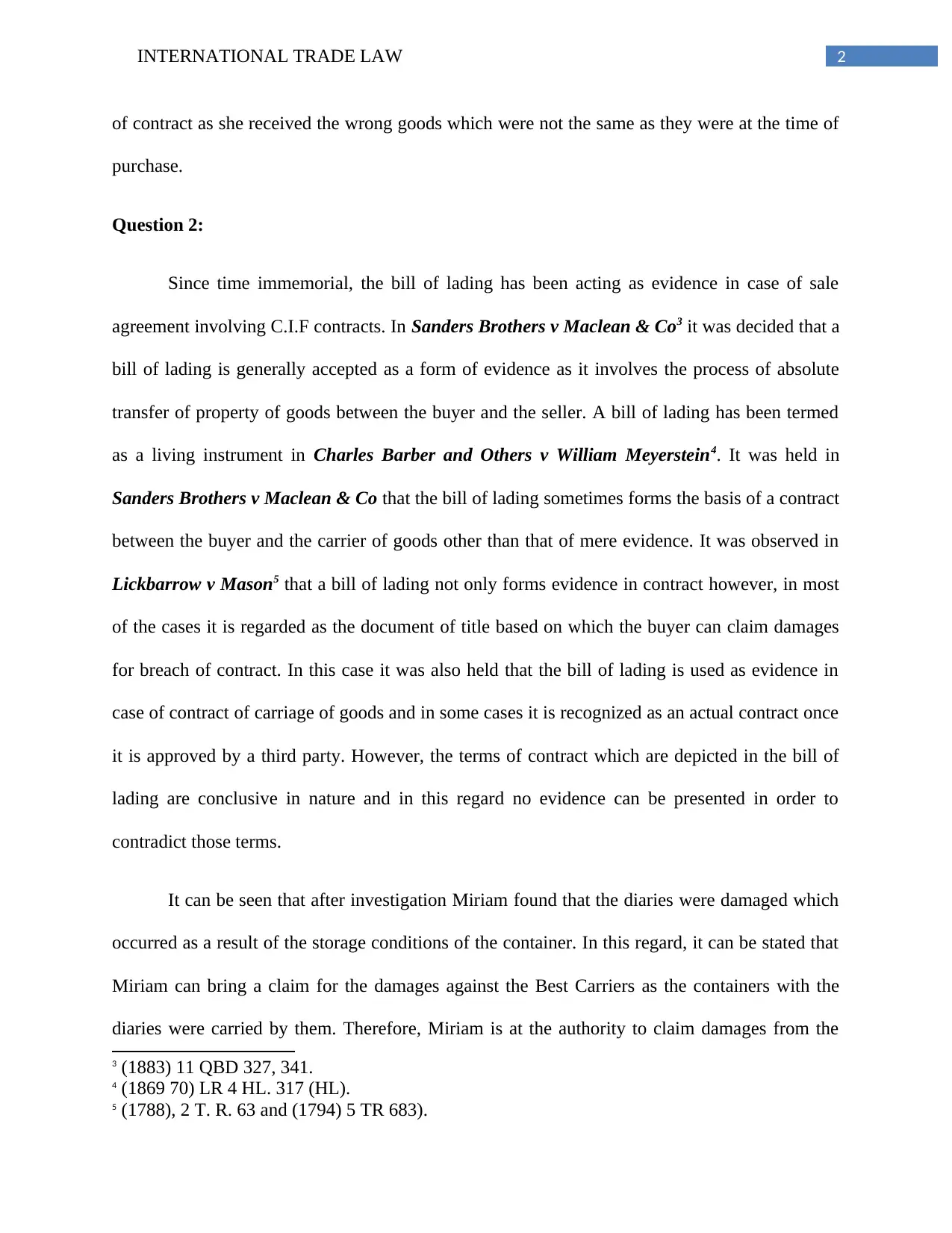
2INTERNATIONAL TRADE LAW
of contract as she received the wrong goods which were not the same as they were at the time of
purchase.
Question 2:
Since time immemorial, the bill of lading has been acting as evidence in case of sale
agreement involving C.I.F contracts. In Sanders Brothers v Maclean & Co3 it was decided that a
bill of lading is generally accepted as a form of evidence as it involves the process of absolute
transfer of property of goods between the buyer and the seller. A bill of lading has been termed
as a living instrument in Charles Barber and Others v William Meyerstein4. It was held in
Sanders Brothers v Maclean & Co that the bill of lading sometimes forms the basis of a contract
between the buyer and the carrier of goods other than that of mere evidence. It was observed in
Lickbarrow v Mason5 that a bill of lading not only forms evidence in contract however, in most
of the cases it is regarded as the document of title based on which the buyer can claim damages
for breach of contract. In this case it was also held that the bill of lading is used as evidence in
case of contract of carriage of goods and in some cases it is recognized as an actual contract once
it is approved by a third party. However, the terms of contract which are depicted in the bill of
lading are conclusive in nature and in this regard no evidence can be presented in order to
contradict those terms.
It can be seen that after investigation Miriam found that the diaries were damaged which
occurred as a result of the storage conditions of the container. In this regard, it can be stated that
Miriam can bring a claim for the damages against the Best Carriers as the containers with the
diaries were carried by them. Therefore, Miriam is at the authority to claim damages from the
3 (1883) 11 QBD 327, 341.
4 (1869 70) LR 4 HL. 317 (HL).
5 (1788), 2 T. R. 63 and (1794) 5 TR 683).
of contract as she received the wrong goods which were not the same as they were at the time of
purchase.
Question 2:
Since time immemorial, the bill of lading has been acting as evidence in case of sale
agreement involving C.I.F contracts. In Sanders Brothers v Maclean & Co3 it was decided that a
bill of lading is generally accepted as a form of evidence as it involves the process of absolute
transfer of property of goods between the buyer and the seller. A bill of lading has been termed
as a living instrument in Charles Barber and Others v William Meyerstein4. It was held in
Sanders Brothers v Maclean & Co that the bill of lading sometimes forms the basis of a contract
between the buyer and the carrier of goods other than that of mere evidence. It was observed in
Lickbarrow v Mason5 that a bill of lading not only forms evidence in contract however, in most
of the cases it is regarded as the document of title based on which the buyer can claim damages
for breach of contract. In this case it was also held that the bill of lading is used as evidence in
case of contract of carriage of goods and in some cases it is recognized as an actual contract once
it is approved by a third party. However, the terms of contract which are depicted in the bill of
lading are conclusive in nature and in this regard no evidence can be presented in order to
contradict those terms.
It can be seen that after investigation Miriam found that the diaries were damaged which
occurred as a result of the storage conditions of the container. In this regard, it can be stated that
Miriam can bring a claim for the damages against the Best Carriers as the containers with the
diaries were carried by them. Therefore, Miriam is at the authority to claim damages from the
3 (1883) 11 QBD 327, 341.
4 (1869 70) LR 4 HL. 317 (HL).
5 (1788), 2 T. R. 63 and (1794) 5 TR 683).
⊘ This is a preview!⊘
Do you want full access?
Subscribe today to unlock all pages.

Trusted by 1+ million students worldwide
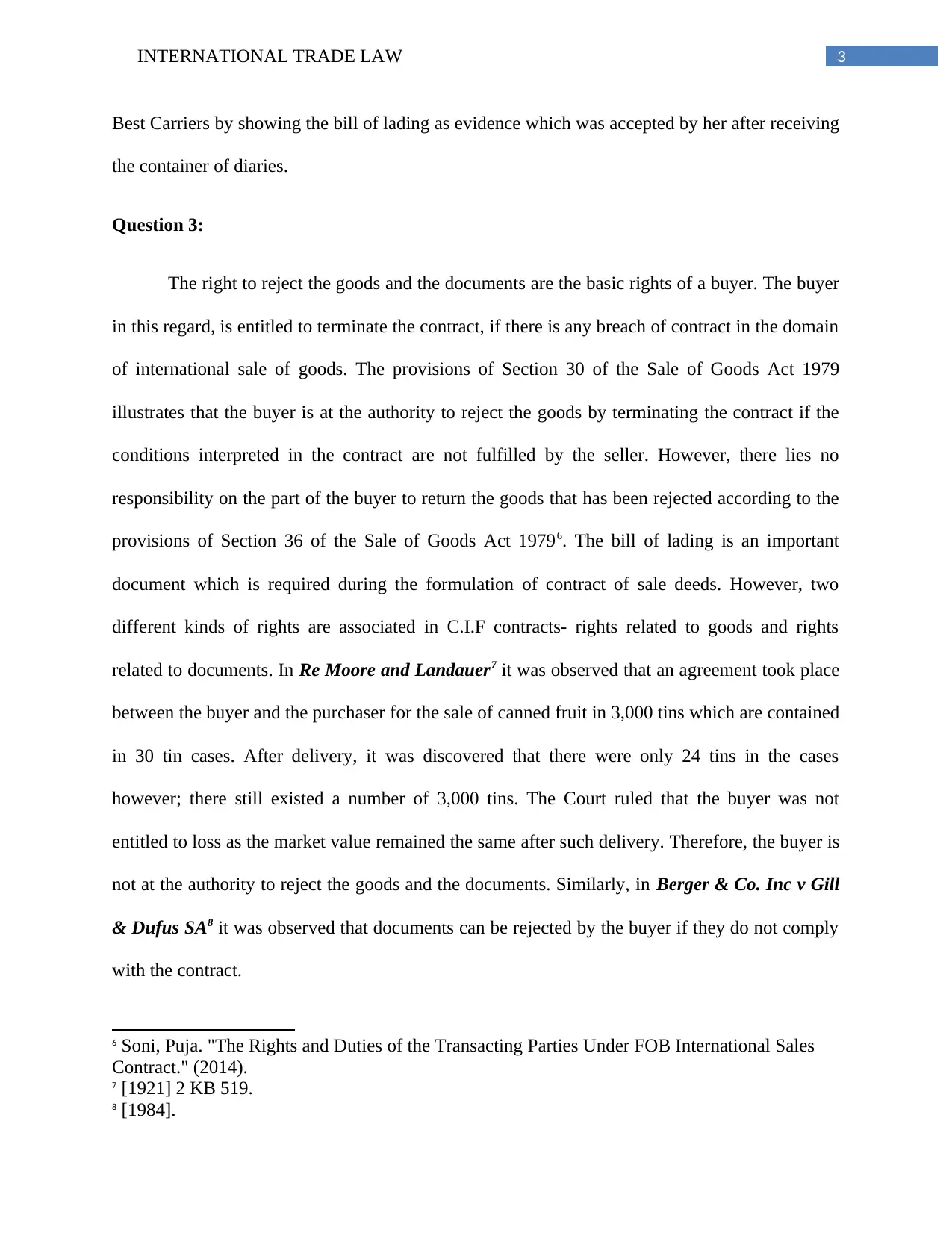
3INTERNATIONAL TRADE LAW
Best Carriers by showing the bill of lading as evidence which was accepted by her after receiving
the container of diaries.
Question 3:
The right to reject the goods and the documents are the basic rights of a buyer. The buyer
in this regard, is entitled to terminate the contract, if there is any breach of contract in the domain
of international sale of goods. The provisions of Section 30 of the Sale of Goods Act 1979
illustrates that the buyer is at the authority to reject the goods by terminating the contract if the
conditions interpreted in the contract are not fulfilled by the seller. However, there lies no
responsibility on the part of the buyer to return the goods that has been rejected according to the
provisions of Section 36 of the Sale of Goods Act 19796. The bill of lading is an important
document which is required during the formulation of contract of sale deeds. However, two
different kinds of rights are associated in C.I.F contracts- rights related to goods and rights
related to documents. In Re Moore and Landauer7 it was observed that an agreement took place
between the buyer and the purchaser for the sale of canned fruit in 3,000 tins which are contained
in 30 tin cases. After delivery, it was discovered that there were only 24 tins in the cases
however; there still existed a number of 3,000 tins. The Court ruled that the buyer was not
entitled to loss as the market value remained the same after such delivery. Therefore, the buyer is
not at the authority to reject the goods and the documents. Similarly, in Berger & Co. Inc v Gill
& Dufus SA8 it was observed that documents can be rejected by the buyer if they do not comply
with the contract.
6 Soni, Puja. "The Rights and Duties of the Transacting Parties Under FOB International Sales
Contract." (2014).
7 [1921] 2 KB 519.
8 [1984].
Best Carriers by showing the bill of lading as evidence which was accepted by her after receiving
the container of diaries.
Question 3:
The right to reject the goods and the documents are the basic rights of a buyer. The buyer
in this regard, is entitled to terminate the contract, if there is any breach of contract in the domain
of international sale of goods. The provisions of Section 30 of the Sale of Goods Act 1979
illustrates that the buyer is at the authority to reject the goods by terminating the contract if the
conditions interpreted in the contract are not fulfilled by the seller. However, there lies no
responsibility on the part of the buyer to return the goods that has been rejected according to the
provisions of Section 36 of the Sale of Goods Act 19796. The bill of lading is an important
document which is required during the formulation of contract of sale deeds. However, two
different kinds of rights are associated in C.I.F contracts- rights related to goods and rights
related to documents. In Re Moore and Landauer7 it was observed that an agreement took place
between the buyer and the purchaser for the sale of canned fruit in 3,000 tins which are contained
in 30 tin cases. After delivery, it was discovered that there were only 24 tins in the cases
however; there still existed a number of 3,000 tins. The Court ruled that the buyer was not
entitled to loss as the market value remained the same after such delivery. Therefore, the buyer is
not at the authority to reject the goods and the documents. Similarly, in Berger & Co. Inc v Gill
& Dufus SA8 it was observed that documents can be rejected by the buyer if they do not comply
with the contract.
6 Soni, Puja. "The Rights and Duties of the Transacting Parties Under FOB International Sales
Contract." (2014).
7 [1921] 2 KB 519.
8 [1984].
Paraphrase This Document
Need a fresh take? Get an instant paraphrase of this document with our AI Paraphraser
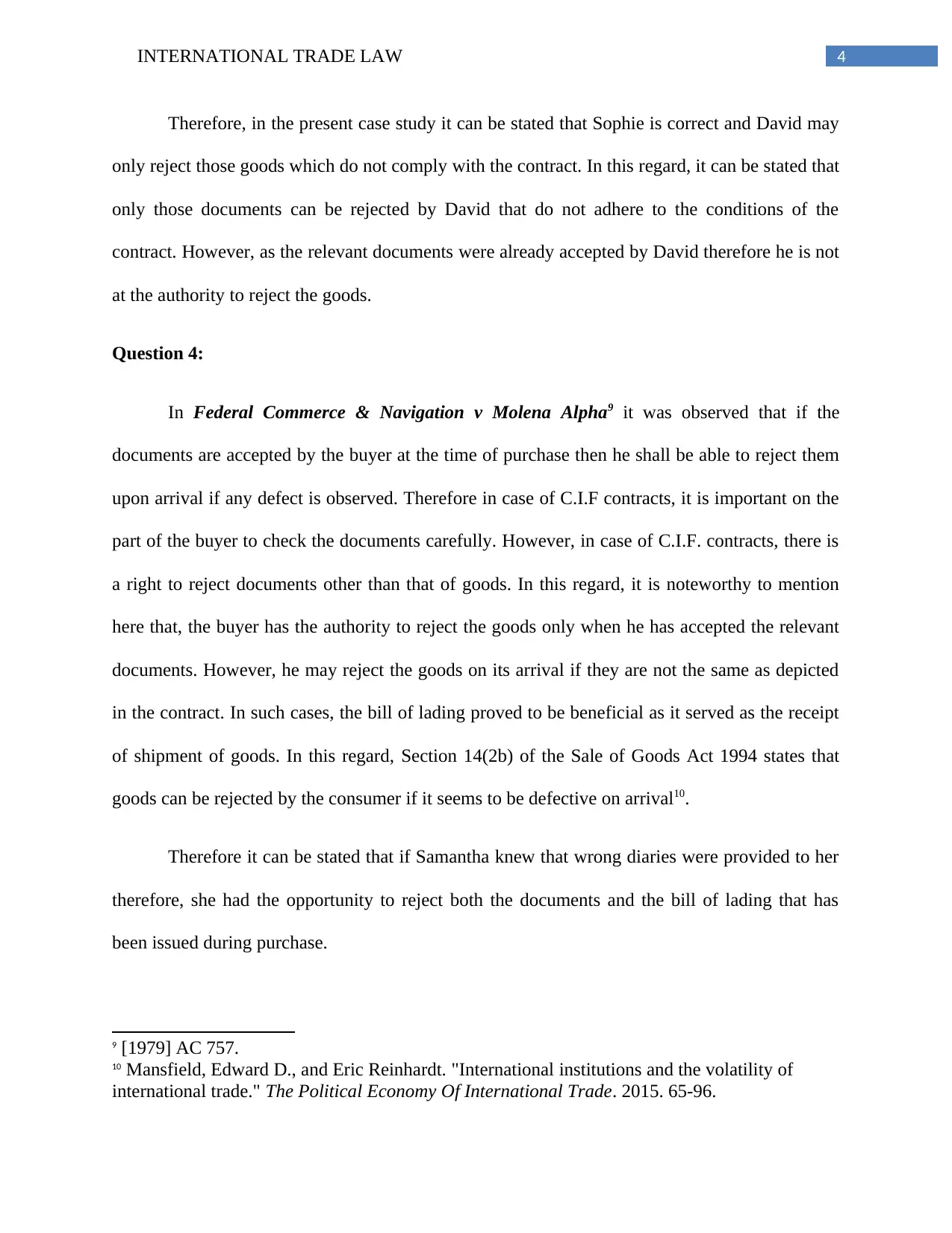
4INTERNATIONAL TRADE LAW
Therefore, in the present case study it can be stated that Sophie is correct and David may
only reject those goods which do not comply with the contract. In this regard, it can be stated that
only those documents can be rejected by David that do not adhere to the conditions of the
contract. However, as the relevant documents were already accepted by David therefore he is not
at the authority to reject the goods.
Question 4:
In Federal Commerce & Navigation v Molena Alpha9 it was observed that if the
documents are accepted by the buyer at the time of purchase then he shall be able to reject them
upon arrival if any defect is observed. Therefore in case of C.I.F contracts, it is important on the
part of the buyer to check the documents carefully. However, in case of C.I.F. contracts, there is
a right to reject documents other than that of goods. In this regard, it is noteworthy to mention
here that, the buyer has the authority to reject the goods only when he has accepted the relevant
documents. However, he may reject the goods on its arrival if they are not the same as depicted
in the contract. In such cases, the bill of lading proved to be beneficial as it served as the receipt
of shipment of goods. In this regard, Section 14(2b) of the Sale of Goods Act 1994 states that
goods can be rejected by the consumer if it seems to be defective on arrival10.
Therefore it can be stated that if Samantha knew that wrong diaries were provided to her
therefore, she had the opportunity to reject both the documents and the bill of lading that has
been issued during purchase.
9 [1979] AC 757.
10 Mansfield, Edward D., and Eric Reinhardt. "International institutions and the volatility of
international trade." The Political Economy Of International Trade. 2015. 65-96.
Therefore, in the present case study it can be stated that Sophie is correct and David may
only reject those goods which do not comply with the contract. In this regard, it can be stated that
only those documents can be rejected by David that do not adhere to the conditions of the
contract. However, as the relevant documents were already accepted by David therefore he is not
at the authority to reject the goods.
Question 4:
In Federal Commerce & Navigation v Molena Alpha9 it was observed that if the
documents are accepted by the buyer at the time of purchase then he shall be able to reject them
upon arrival if any defect is observed. Therefore in case of C.I.F contracts, it is important on the
part of the buyer to check the documents carefully. However, in case of C.I.F. contracts, there is
a right to reject documents other than that of goods. In this regard, it is noteworthy to mention
here that, the buyer has the authority to reject the goods only when he has accepted the relevant
documents. However, he may reject the goods on its arrival if they are not the same as depicted
in the contract. In such cases, the bill of lading proved to be beneficial as it served as the receipt
of shipment of goods. In this regard, Section 14(2b) of the Sale of Goods Act 1994 states that
goods can be rejected by the consumer if it seems to be defective on arrival10.
Therefore it can be stated that if Samantha knew that wrong diaries were provided to her
therefore, she had the opportunity to reject both the documents and the bill of lading that has
been issued during purchase.
9 [1979] AC 757.
10 Mansfield, Edward D., and Eric Reinhardt. "International institutions and the volatility of
international trade." The Political Economy Of International Trade. 2015. 65-96.

5INTERNATIONAL TRADE LAW
⊘ This is a preview!⊘
Do you want full access?
Subscribe today to unlock all pages.

Trusted by 1+ million students worldwide
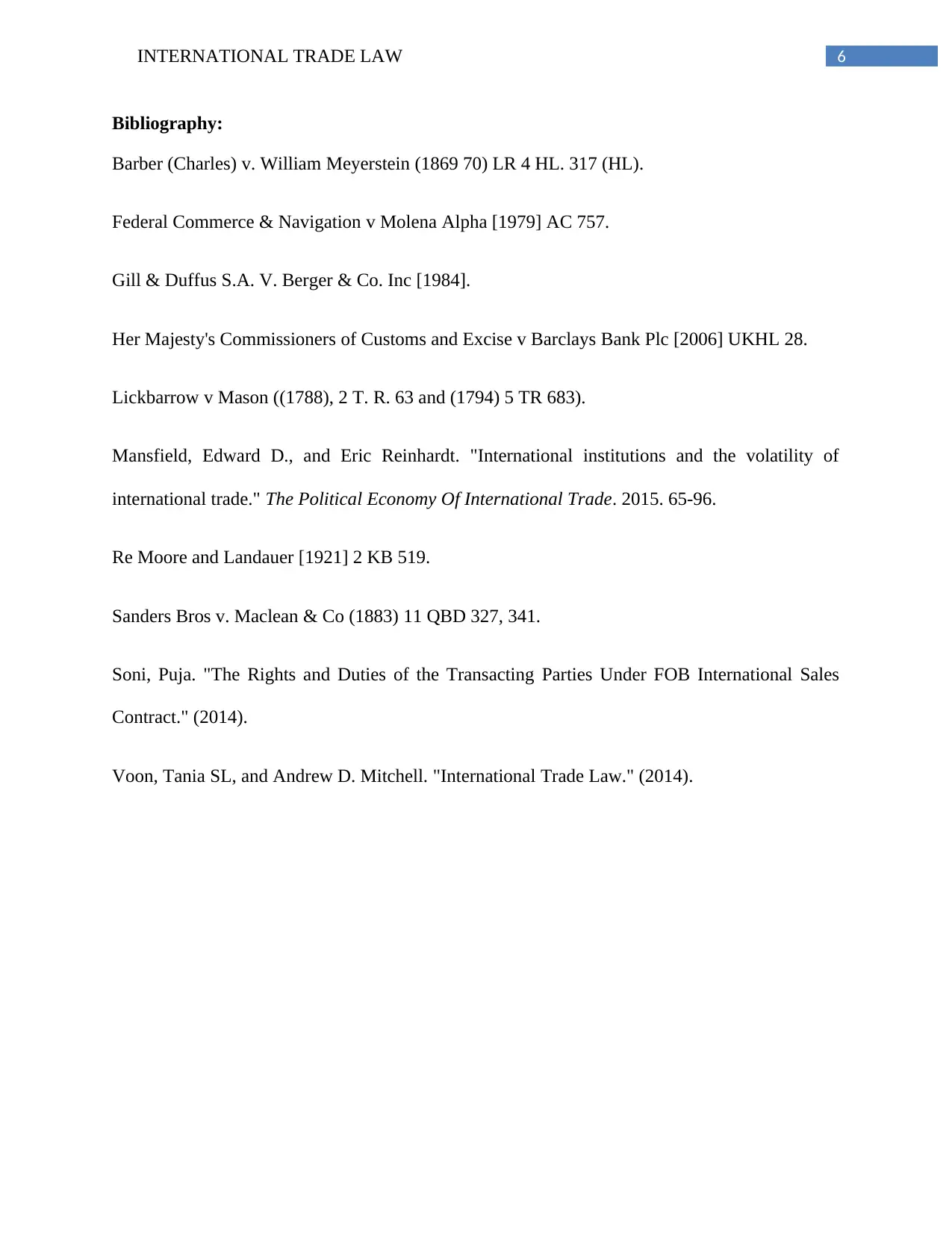
6INTERNATIONAL TRADE LAW
Bibliography:
Barber (Charles) v. William Meyerstein (1869 70) LR 4 HL. 317 (HL).
Federal Commerce & Navigation v Molena Alpha [1979] AC 757.
Gill & Duffus S.A. V. Berger & Co. Inc [1984].
Her Majesty's Commissioners of Customs and Excise v Barclays Bank Plc [2006] UKHL 28.
Lickbarrow v Mason ((1788), 2 T. R. 63 and (1794) 5 TR 683).
Mansfield, Edward D., and Eric Reinhardt. "International institutions and the volatility of
international trade." The Political Economy Of International Trade. 2015. 65-96.
Re Moore and Landauer [1921] 2 KB 519.
Sanders Bros v. Maclean & Co (1883) 11 QBD 327, 341.
Soni, Puja. "The Rights and Duties of the Transacting Parties Under FOB International Sales
Contract." (2014).
Voon, Tania SL, and Andrew D. Mitchell. "International Trade Law." (2014).
Bibliography:
Barber (Charles) v. William Meyerstein (1869 70) LR 4 HL. 317 (HL).
Federal Commerce & Navigation v Molena Alpha [1979] AC 757.
Gill & Duffus S.A. V. Berger & Co. Inc [1984].
Her Majesty's Commissioners of Customs and Excise v Barclays Bank Plc [2006] UKHL 28.
Lickbarrow v Mason ((1788), 2 T. R. 63 and (1794) 5 TR 683).
Mansfield, Edward D., and Eric Reinhardt. "International institutions and the volatility of
international trade." The Political Economy Of International Trade. 2015. 65-96.
Re Moore and Landauer [1921] 2 KB 519.
Sanders Bros v. Maclean & Co (1883) 11 QBD 327, 341.
Soni, Puja. "The Rights and Duties of the Transacting Parties Under FOB International Sales
Contract." (2014).
Voon, Tania SL, and Andrew D. Mitchell. "International Trade Law." (2014).
1 out of 7
Related Documents
Your All-in-One AI-Powered Toolkit for Academic Success.
+13062052269
info@desklib.com
Available 24*7 on WhatsApp / Email
![[object Object]](/_next/static/media/star-bottom.7253800d.svg)
Unlock your academic potential
Copyright © 2020–2026 A2Z Services. All Rights Reserved. Developed and managed by ZUCOL.





